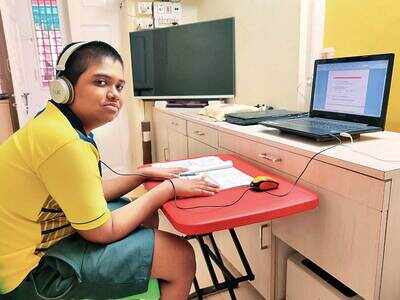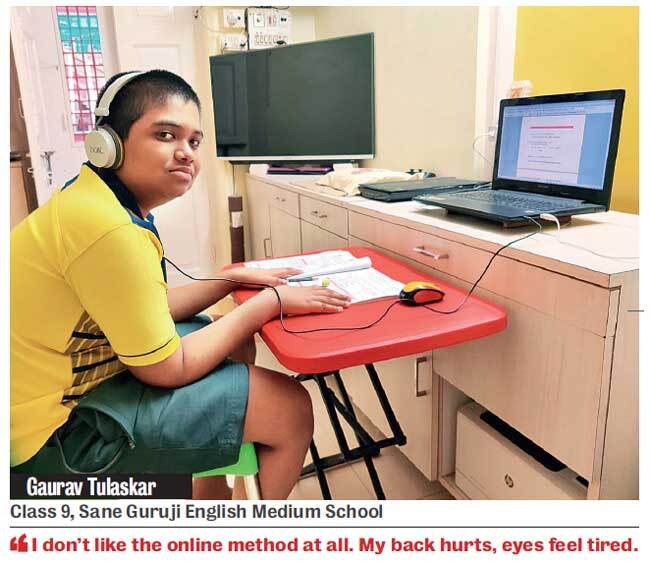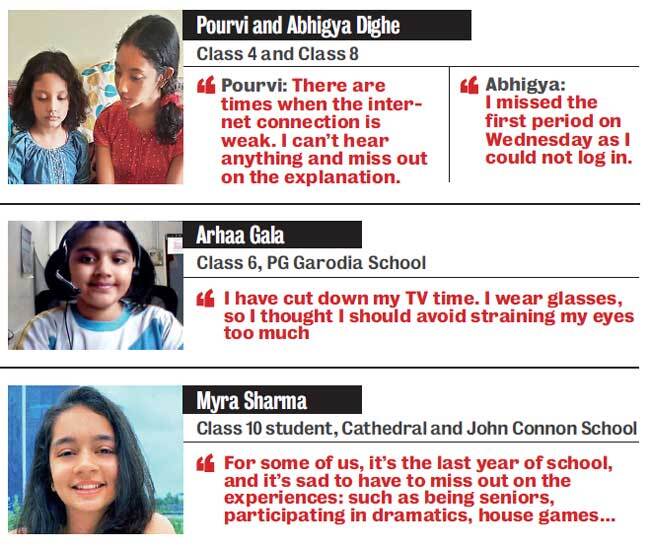All eyes on the screen

Gaurav Tulaskar, Class 9, Sane Guruji English Medium School
The govt has capped online learning time, but school students say they still have to cope with eye strain, erratic internet connection and sometimes sibling conflict
Putting on the uniform, readying theschool bag , hastily packing the tiffin box and water bottle, waiting to catch the school bus and spending hours in a classroom in the company of chattering friends and classmates… Ever since the lockdown, the school life experience has been reduced to sitting before a screen. And although there doesn’t seem to be an alternative, the new normal flies in the face of pre-lockdown conventional wisdom that suggested that children’s screen-time be reduced.
On Monday, the school education department banned online classes till class 2, while screen time for class 3 to 5, class 6 to 8 and class 9 to 12 have been capped at one hour, two hours and three hours, respectively, with breaks and offline assignments. However, with additional online tuition classes, students are easily spending five to seven hours before a screen every day.
Abhigya , a class 4 student of an ICSE school in Santacruz, use their mother’s mobile phone . Pourvi hates waking up early for the morning session that begins at 8 am and ends at 12.45 pm, with four breaks of ten minutes each.

“There are times when the internet connection is weak. I can’t hear anything then. Sometimes I get an echo, which is stressful,” said Pourvi, who also attends hour-long Math tuitions twice a week. Abhigya missed out on the first period on Wednesday as she could not log in. Quarrels often break out between sisters over using the phone. Sometimes their classes overlap, and they also fight over who gets to check the timetable first. They miss their classmates and can’t wait to get back to regular school.
Colaba-based sisters Sarah and Aiman Chamdawala, students of the Cathedral and John Connon School spend about four hours at their online school, with a 30-minute lunch break. Their pet peeve is the erratic WiFi network. Sarah, 17, points out that teachers would like them to have their videos on, as it’s more like a classroom then, but often students’ networks are very weak. Aiman, 16, who recently took admission to grade 11 complains about her inability to make new friends at the new school. Sarah is also nursing a disappointment. She was made a prefect on the first day of school in March, but the lockdown came into effect the very next day.

Though poor network seems to bind the accounts of students, class 10 student Myra Sharma said prolonged screen time, including TV viewing, strains her eyes. The 15-year-old Kemp’s Corner resident said she feels the classroom experience is very important. “For some of us, it’s the last year of school, and it’s sad to have to miss out on the experiences. It’s an exciting year, and it’s a lot to miss out on,” said Myra. In addition to school, Myra also has ballet and jazz funk dance classes online.
At the Tulaskars’ house in Dadar, 13-year-old Gaurav, a class 9 student of Sane Guruji English Medium School, is new to online learning. His state board school started virtual sessions from June 15. In addition to three-and-a-half hours of school (with breaks), he has online tuitions for two hours every week. “I don’t like the online method at all. My back hurts, eyes feel tired,” he complained. So far, he has been using a laptop, but his older sibling, who is pursuing engineering, needs the device for his own classes.
To balance out the increased screen time, Arhaa Gala, a student in class 6 at PGGarodia School in Ghatkopar has cut down on TV time. “I wear glasses, so I thought I should avoid straining my eyes too much,” she said. Gala, who used to watch detective shows for two hours a day, now limits her daily TV time to half an hour.
HC seeks clarity on grading
The Bombay High Court has sought clarity from the Council for the Indian School Certificate Examinations (CISCE) on how would students be graded if they opt to not appear for the remaining exams for class 10 and 12. The parents have stressed that the decision to appear or opt out will depend on the methodology.
A division bench of Chief Justice Dipankar Datta and Justice SS Shinde on Wednesday asked CISCE to inform the court about the methodology on June 22 and also extend the deadline for the students to inform the council about their decision by two days. The deadline earlier was 12 noon on June 22.
MMB
Putting on the uniform, readying the
On Monday, the school education department banned online classes till class 2, while screen time for class 3 to 5, class 6 to 8 and class 9 to 12 have been capped at one hour, two hours and three hours, respectively, with breaks and offline assignments. However, with additional online tuition classes, students are easily spending five to seven hours before a screen every day.
Pourvi Dighe, 13, a class 8 student and her eight-year-old sister

.
“There are times when the internet connection is weak. I can’t hear anything then. Sometimes I get an echo, which is stressful,” said Pourvi, who also attends hour-long Math tuitions twice a week. Abhigya missed out on the first period on Wednesday as she could not log in. Quarrels often break out between sisters over using the phone. Sometimes their classes overlap, and they also fight over who gets to check the timetable first. They miss their classmates and can’t wait to get back to regular school.
Colaba-based sisters Sarah and Aiman Chamdawala, students of the Cathedral and John Connon School spend about four hours at their online school, with a 30-minute lunch break. Their pet peeve is the erratic WiFi network. Sarah, 17, points out that teachers would like them to have their videos on, as it’s more like a classroom then, but often students’ networks are very weak. Aiman, 16, who recently took admission to grade 11 complains about her inability to make new friends at the new school. Sarah is also nursing a disappointment. She was made a prefect on the first day of school in March, but the lockdown came into effect the very next day.

.
Though poor network seems to bind the accounts of students, class 10 student Myra Sharma said prolonged screen time, including TV viewing, strains her eyes. The 15-year-old Kemp’s Corner resident said she feels the classroom experience is very important. “For some of us, it’s the last year of school, and it’s sad to have to miss out on the experiences. It’s an exciting year, and it’s a lot to miss out on,” said Myra. In addition to school, Myra also has ballet and jazz funk dance classes online.
At the Tulaskars’ house in Dadar, 13-year-old Gaurav, a class 9 student of Sane Guruji English Medium School, is new to online learning. His state board school started virtual sessions from June 15. In addition to three-and-a-half hours of school (with breaks), he has online tuitions for two hours every week. “I don’t like the online method at all. My back hurts, eyes feel tired,” he complained. So far, he has been using a laptop, but his older sibling, who is pursuing engineering, needs the device for his own classes.
To balance out the increased screen time, Arhaa Gala, a student in class 6 at PG
HC seeks clarity on grading
The Bombay High Court has sought clarity from the Council for the Indian School Certificate Examinations (CISCE) on how would students be graded if they opt to not appear for the remaining exams for class 10 and 12. The parents have stressed that the decision to appear or opt out will depend on the methodology.
A division bench of Chief Justice Dipankar Datta and Justice SS Shinde on Wednesday asked CISCE to inform the court about the methodology on June 22 and also extend the deadline for the students to inform the council about their decision by two days. The deadline earlier was 12 noon on June 22.
MMB
GALLERIES View more photos









